---------------------------------------------------------
An important part of keeping your rabbit healthy is ensuring good dental health. Dental problems in rabbits can go sideways pretty quickly so it’s a good idea to include dental health as part of your normal bunny care routine.
Rabbit Teeth
A quick look at your rabbit’s mouth and you might think they only have the 4 front teeth, but hiding in that cute little bunny mouth are 28 teeth! The most prominent (and most likely to have issues) teeth in your bunny’s mouth are the four large incisors, 2 on the top and 2 on the bottom.
Behind the main top incisors are two little mini incisors called peg teeth. The large incisors & peg teeth are mostly used for grabbing & slicing food (and sometimes power cords!).
The remaining 22 teeth are called “cheek teeth” and are made up of molars & tiny premolars used to grind up food. Wild rabbits are natural foragers, and eating a constant diet of fibrous roots, grasses, leaves, and bark is really hard on teeth. God, in his wisdom, has given rabbits open-rooted teeth. This means that they will continue to grow throughout their lives, sort of similar to fingernails. This way, a chipped or broken tooth in a wild rabbit doesn’t have to be a death sentence.
In a healthy rabbit, the teeth are straight and meet up together, perfectly aligned. In the wild, a rabbit would keep their back cheek teeth short through grinding grass and keep the front incisors short & sharpened by chewing and slicing twigs and pulling bark from trees. When keeping domestic rabbits, it is important to provide similar experiences so the rabbit can take care of her teeth. If a rabbit has dental problems and stops eating, it can be fatal in as little as 24 hours, so keeping their teeth healthy is important for healthy rabbits.
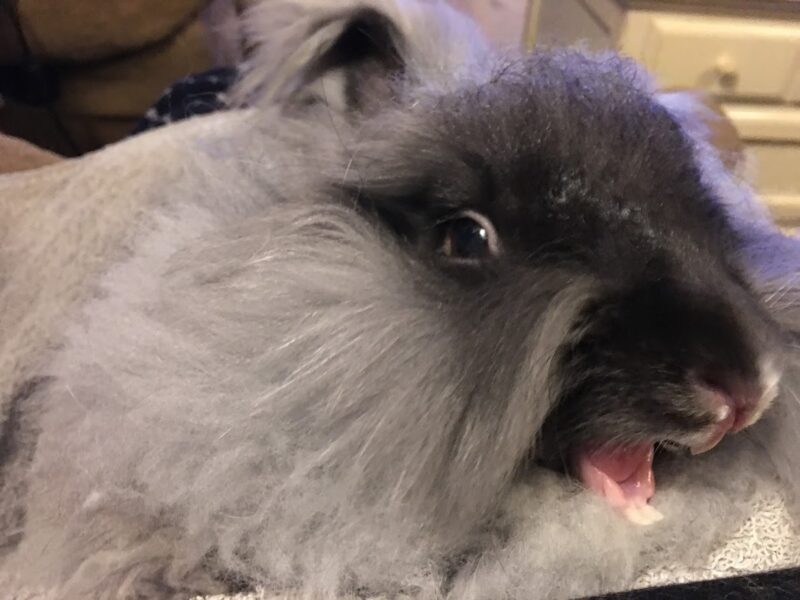
Tooth Problems
The rabbits most at risk for dental problems are ones that live indoors and eat a primarily pellet-based diet. The longer a rabbit lives like this, the higher the risk is. Rabbit pellets provide nutrition, but don’t provide enough fiber & resistance, particularly for the large slicing incisors, to keep teeth in tip-top shape.
The back teeth can also suffer from a high pellet diet by not having enough to grind. When the back teeth are not used enough, they can wear unevenly, making them align unevenly. Left unchecked, the molars can develop sharp edges that can cut the inside of the cheek or tongue, which not only hurt, but could become infected and cause an abscess.
When the teeth don’t line up properly, it is called malocclusion. Some rabbits might be born with maloccluded teeth, and others could have an injury that causes it. The most common reason in domestic rabbits is a low-fiber diet. Besides the risk of developing sharp edges, maloccluded teeth can also cause the tooth root to become impacted which is very painful and could even lead to an abscess forming in the jaw bone.
Keeping rabbit teeth short & aligned is far easier than trying to treat them once they become a problem. When their teeth get long and maligned, they can be trimmed with clippers or sanded down with a Dremel or sanding disk. This can be risky because you could chip or split the tooth, which is painful for your bunny & could introduce infection at the root. It’s best left to a veterinarian experienced with rabbits. If malocclusion is a congenital, ongoing problem with your bunny, your vet might be able to show you how to do it yourself, but in general I would not recommend undertaking something like this. Many rabbits will not sit still while you are fussing around in their mouth, especially if it is tender, so it is often necessary to put the rabbit under anesthesia.
How to care for your rabbit’s teeth
Hay, hay, and more hay
One of the most important things you can do is provide unlimited hay. This is not only great for digestive health, but it’s vital for dental health as well. For bonus points, try offering different kinds of hay. The different textures will make your rabbit use different chewing motions. An adult rabbit should go through a bundle of hay roughly the size of their body each day. If your bunny isn’t eating as much hay as he should, you might be feeding too many pellets. I know my bunnies’ first choice of food is pellets, and if I give them too much, they would gladly fill up on that leaving no room for fresh veggies or hay. Speaking of fresh veggies, providing a variety of greens from crisp lettuce leaves to fibrous herb sprigs or celery is another great toothy workout.
Provide chewing opportunities
Give your rabbits the same experiences wild rabbits would have. Tough tree branches, leaves, or twigs not only will save your furniture from chewing, but it will also provide your bunny with a great dental workout. Chew blocks aren’t always the best option because they don’t provide chewing for both the incisors and molars. You can use purchased chew sticks, or just search your backyard. Before giving your bunny a stick you found in the yard, make sure you know it was not treated with any pesticides. Safe woods include fresh or dried branches from orange, lemon, apple, pear, willow, or poplar trees and dried branches from maple or pine (you can even use lumber pieces as long as they aren’t treated with anything). You should avoid using wood from “pit” fruit trees (like peaches or cherries).
Check her teeth about once a month
Try to examine your bunny’s teeth every month. Gently lay her on her back, on your lap. Pull back her lips so you can see her incisors. Check that they are lined up on top & bottom. Her gums should be nice & pink (not white, red, or bluish-purple). Sniff her breath. It should smell sweet & grassy; a rotten smell can indicate an infection (unless she has recently eaten some poop, if so, I am sorry I suggested smelling her breath!). You will likely not be able to visually inspect the molars without really stressing her out and risking your fingers in the process. Feel the left & right sides of your rabbit’s head, below her eyes and along her lower jaw. If you feel a lump on one side, or if your rabbit seems in pain when you touch a spot you should call your vet.
Other signs to look for
Rabbits are prey animals and have developed almost supernatural abilities to disguise weakness & pain, so if you notice any of these signs, the dental problem has likely been going on for some time and it’s important for you to act quickly
- digging at his mouth with his paws
- drooling or discharge from the mouth
- swelling on face
- loss of interest in eating
- abnormal feces
- eye or nasal discharge (infections can travel into the sinuses)
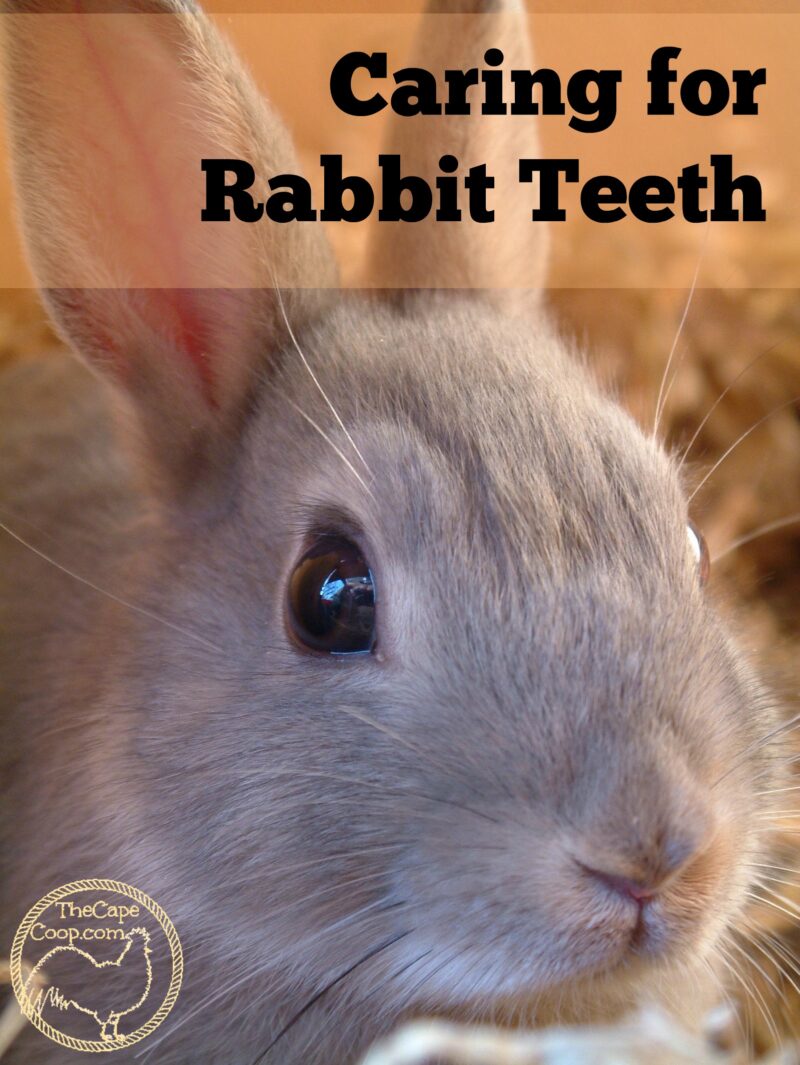
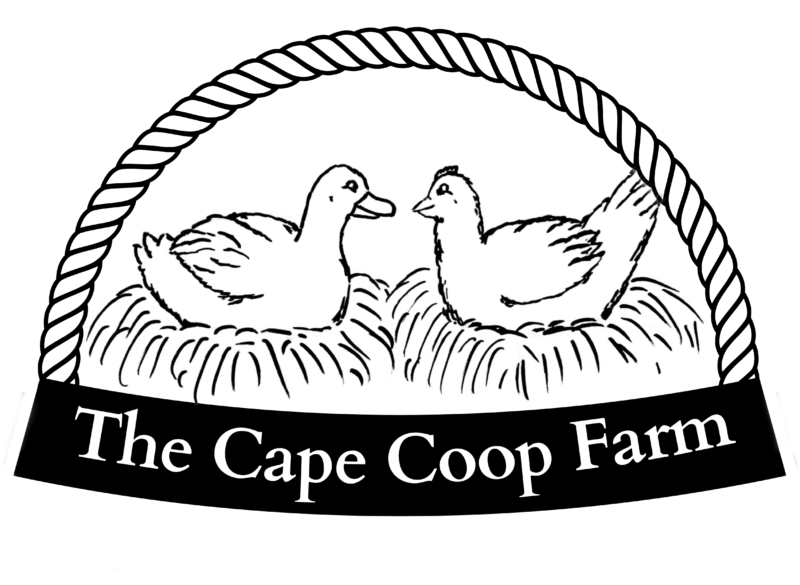

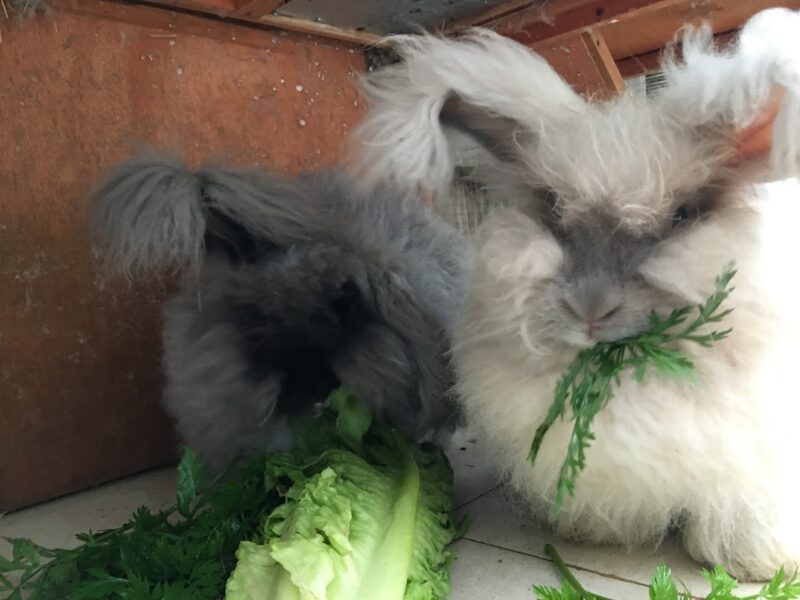
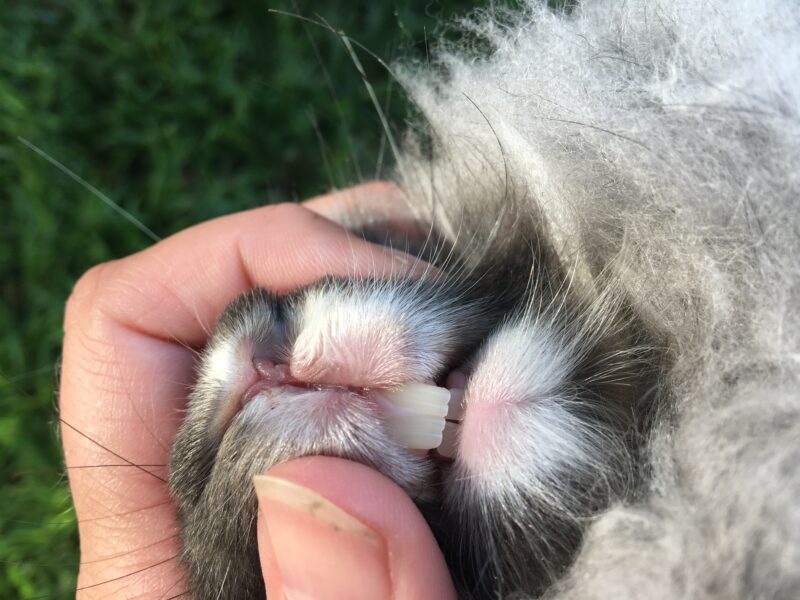



Tessa-Marie McDonald
Tuesday 13th of April 2021
I'm worried about my rabbit and can't seem to get to the bottom of what's wrong with him He has discharged just on one side of his nose, well a bit of a yellow dryness to it. He's sneezing badly like 15 in a row at times We have removed wood shavings but vet thinks might be something stuck up there but for a ct scan it'd be 700 plus. Wondering how if it's his teeth? But he's only little so not sure. He doesn't like being picked up at the minute so was hard to check them? Just wondered if anyone has experienced any nose problems with their rabbit
Liz
Wednesday 14th of April 2021
Did your vet do any testing on him? Respiratory issues can be common in rabbits, snuffles is a respiratory disease that causes discharge and sneezing. It is caused by a bacterial infection and would require antibiotics to clear it up.
painter
Friday 1st of January 2021
Thanks designed for sharing such a pleasant thought, post is nice, thats why i have read it entirely
Amber
Tuesday 9th of April 2019
Hi do u know an average cost to get my rabbits teeth trimmed his teeth has cotton to long and he’s just started drooling please help me :(
Liz
Tuesday 9th of April 2019
Oh no! I am sorry I don't know the average cost. I would start with a call to your vet, I bet they could give you a ballpark estimate over the phone
brighton gum clinic
Wednesday 16th of May 2018
I am happy to find this post very useful for me
Herminia Calderon
Wednesday 28th of February 2018
My rabbits teeth he need help afordable
Liz
Wednesday 28th of February 2018
Hi Herminia, I'm not sure what the issue is with your rabbit's teeth, but if they need filing or repairing, it's a pretty tricky thing to do on your own. Maybe call your local animal shelter and see if they can recommend a vet that does low or no cost care?